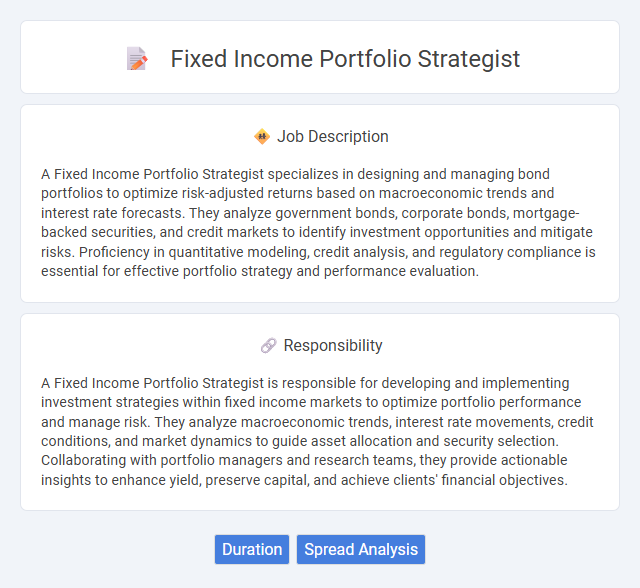
A Fixed Income Portfolio Strategist specializes in designing and managing bond portfolios to optimize risk-adjusted returns based on macroeconomic trends and interest rate forecasts. They analyze government bonds, corporate bonds, mortgage-backed securities, and credit markets to identify investment opportunities and mitigate risks. Proficiency in quantitative modeling, credit analysis, and regulatory compliance is essential for effective portfolio strategy and performance evaluation.
Individuals with strong analytical skills and a deep understanding of market dynamics are likely suitable for a Fixed Income Portfolio Strategist role. Those who thrive in fast-paced environments and possess the ability to assess risk and forecast interest rate movements may find alignment with the job's demands. Candidates lacking attention to detail or comfort with quantitative data analysis might face challenges in succeeding in this position.
Qualification
A Fixed Income Portfolio Strategist typically requires a strong background in finance, economics, or a related field, often supported by advanced degrees such as an MBA or a Master's in Finance. Expertise in bond markets, credit analysis, risk management, and portfolio construction is essential, alongside proficiency in financial modeling and quantitative analysis tools. Professional certifications like CFA (Chartered Financial Analyst) significantly enhance qualifications by demonstrating mastery in investment management and fixed income securities.
Responsibility
A Fixed Income Portfolio Strategist is responsible for developing and implementing investment strategies within fixed income markets to optimize portfolio performance and manage risk. They analyze macroeconomic trends, interest rate movements, credit conditions, and market dynamics to guide asset allocation and security selection. Collaborating with portfolio managers and research teams, they provide actionable insights to enhance yield, preserve capital, and achieve clients' financial objectives.
Benefit
A Fixed Income Portfolio Strategist likely provides significant benefits by optimizing bond investments to enhance returns while managing risk effectively. This role probably aids in identifying market trends and interest rate movements, improving portfolio resilience during economic fluctuations. Employing advanced analytical tools and insights, the strategist may contribute to more informed decision-making and potentially higher portfolio performance.
Challenge
Navigating the complexities of fixed income markets may present a constant challenge for a Fixed Income Portfolio Strategist, requiring anticipation of interest rate fluctuations and credit risk. The probability of encountering volatile economic cycles demands rigorous analysis and agile adjustments to portfolio strategies. Adapting to regulatory changes while maintaining risk-adjusted returns likely tests both expertise and strategic foresight in this role.
Career Advancement
A Fixed Income Portfolio Strategist drives investment decisions using market analysis, credit research, and interest rate forecasts to optimize bond portfolios and manage risk effectively. Career advancement in this role often includes progression to senior strategist positions, portfolio management leadership, or Chief Investment Officer roles within asset management firms or institutional investors. Mastery of fixed income markets, quantitative skills, and a track record of delivering solid risk-adjusted returns are key factors for upward mobility.
Key Terms
Duration
A Fixed Income Portfolio Strategist specializing in duration focuses on managing interest rate risk by adjusting the portfolio's average duration to align with market forecasts and client objectives. They analyze yield curve movements, macroeconomic indicators, and monetary policy changes to optimize bond maturity structures and enhance risk-adjusted returns. Their expertise in duration management helps mitigate volatility and protect capital in fluctuating interest rate environments.
Spread Analysis
A Fixed Income Portfolio Strategist specializing in spread analysis evaluates the yield differentials between various debt securities to identify relative value opportunities and assess risk premia. This role involves deep quantitative modeling, credit research, and macroeconomic analysis to forecast spread movements and optimize bond portfolio allocations. Expertise in sectors such as corporate bonds, municipal bonds, and mortgage-backed securities enhances the ability to manage duration, convexity, and credit risk effectively.
 kuljobs.com
kuljobs.com